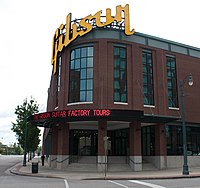History and Innovations of Gibson Brands
- Orville Gibson started making instruments in 1894
- Gibson Mandolin-Guitar Mfg. Co. Ltd. was incorporated in 1902
- Lloyd Loar designed flagship instruments in the 1920s
- Gibson introduced the ES-150, its first Electric Spanish model, in 1936
- Guy Hart ran Gibson from 1924-1948, a period of innovation and growth
- Gibson invented archtop guitars with carved, arched tops
- Gibson introduced flattop acoustic guitars in the 1930s
- Gibson made one of the first commercially available hollow-body electric guitars
- Gibson introduced the Les Paul, its most popular guitar, in 1952
- Gibson was at the forefront of innovation in acoustic guitars during the big band era
Ownership Changes and Bankruptcy
- Gibson was bought by Chicago Musical Instruments (CMI) in 1944
- Norlin Corporation acquired Gibson in 1969
- Henry Juszkiewicz and David H. Berryman acquired Gibson in 1986
- Kohlberg Kravis Roberts acquired Gibson in November 2018
- Gibson filed for Chapter 11 bankruptcy protection in May 2018
- Gibson announced a restructuring plan to return to profitability
- Unprofitable consumer electronics divisions like Gibson Innovations were closed down
- Gibson exited Chapter 11 bankruptcy in November 2018
Expansion, Acquisitions, and Record Label
- Gibson purchased Garrison Guitars in 2007
- In 2011, Gibson acquired the Stanton Group, including Cerwin Vega, KRK Systems, and Stanton DJ
- Gibson announced a partnership with the Japanese-based Onkyo Corporation in 2012
- In 2013, Gibson acquired a majority stake in TEAC Corporation
- In 2014, Gibson acquired the Woox consumer electronics brand from Royal Philips
- Gibson launched Gibson Records in July 2021
- The record label focuses on releasing guitar-centric music
Legal Actions and Disputes
- Gibson sued Hoshino Gakki/Elger Guitars in 1977 for copying the archtop headstock
- Gibson sued Fernandes Guitars in 2000 for allegedly copying Gibson designs
- Gibson also sued PRS Guitars in 2005 to stop them from making their Singlecut model
- Gibson's factories were raided by the United States Fish and Wildlife Service (FWS) in 2009 and 2011
- Gibson admitted to violating the Lacey Act in 2012 and settled the case with the United States Department of Justice
- Gibson filed a trademark infringement lawsuit against WowWee USA and its Paper Jamz toys
- Gibson sent a cease and desist letter to Kiesel regarding two guitar models
- Gibson sued German manufacturer Warwick over a guitar model that imitated the Flying V
- Gibson sued Dean Guitars for trademark infringement
Gibson Instruments and Manufacturing Facilities
- Gibson owns and makes instruments under various brands, including Epiphone, Kramer, Maestro, Steinberger, and Tobias
- Gibson also owns historical brands such as Kalamazoo, Dobro, Valley Arts, and Baldwin
- Gibson relaunched Kramer Guitars in 2020 with new collections and artist collaborations
- Epiphone, a former competitor, was purchased by Gibson and now offers competitively-priced Gibson-styled models
- Gibson has a history of seeking legal action against those making and selling guitars similar to their own
- Gibson has manufacturing facilities in Kalamazoo, MI; Nashville, TN; Memphis, TN; Bozeman, MT; and Qingdao, China
Gibson Brands Inc. (formerly Gibson Guitar Corporation) is an American manufacturer of guitars, other musical instruments, and professional audio equipment from Kalamazoo, Michigan, and now based in Nashville, Tennessee. The company was formerly known as Gibson Guitar Corporation and renamed Gibson Brands Inc. on June 11, 2013.
 | |
 Gibson Guitar Factory in Memphis, pictured in May 2009 | |
| Formerly | Gibson Guitar Corp. |
|---|---|
| Type | Private |
| Industry | Musical instruments |
| Founded | 1894 in Kalamazoo, Michigan |
| Founder | Orville Gibson |
| Headquarters | , |
Area served | Worldwide |
Key people | |
| Products | electric and acoustic guitars, basses, strings |
| Brands | |
| Parent | KKR & Co. Inc. |
| Subsidiaries | List |
| Website | gibson.com |
Orville Gibson started making instruments in 1894 and founded the company in 1902 as the Gibson Mandolin-Guitar Mfg. Co. Ltd. in Kalamazoo, Michigan, to make mandolin-family instruments. Gibson invented archtop guitars by constructing the same type of carved, arched tops used on violins. By the 1930s, the company was also making flattop acoustic guitars, as well as one of the first commercially available hollow-body electric guitars, used and popularised by Charlie Christian. In 1944, Gibson was bought by Chicago Musical Instruments (CMI), which was acquired in 1969 by Panama-based conglomerate Ecuadorian Company Limited (ECL), that changed its name in the same year to Norlin Corporation. Gibson was owned by Norlin Corporation from 1969 to 1986. In 1986, the company was acquired by a group led by Henry Juszkiewicz and David H. Berryman. In November 2018, the company was acquired by a group of investors led by private equity firm Kohlberg Kravis Roberts.
Gibson sells guitars under a variety of brand names and builds one of the world's best-known guitars, the Gibson Les Paul. Gibson was at the forefront of innovation in acoustic guitars, especially in the big band era of the 1930s; the Gibson Super 400 was widely imitated. In 1952, Gibson introduced its first solid-body electric guitar, the Les Paul, which became its most popular guitar to date—designed by a team led by Ted McCarty.
In addition to guitars, Gibson offers consumer electronics through the Gibson Pro Audio division, which includes KRK.
On May 1, 2018, the company filed for Chapter 11 bankruptcy protection, and announced a restructuring plan to return to profitability by closing down unprofitable consumer electronics divisions such as Gibson Innovations. The company exited Chapter 11 bankruptcy in November 2018.
In January 2020, the company launched Gibson TV, an online television network focused on guitars and music culture.